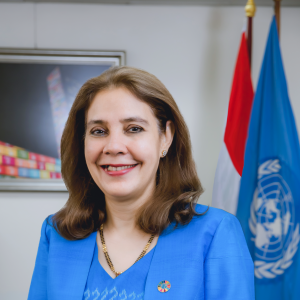Inaugural Global Business Summit on Belt and Road Infrastructure Investment for Better Business Better World and Sustainable Development Goals Date - Resident Coordinator's Speech, Gita Sabharwal
-----
How does the UN in Indonesia see the role of business in contributing to the sustainable development agenda, and how have you sought to engage with the private sector?
Let me address this question from the perspective of Indonesia, which has fully committed to the SDGs and integrated them into core national plans and policies.
Indonesia has made great progress on the SDGs with 62% of indicators on track. However, there remains a $1.7 trillion funding gap if we are to achieve all the targets by 2030.
Given fiscal constraints faced by the government, closing this gap will require significant contributions from the domestic and international private sector and banks while leveraging innovative financing.
Encouragingly, the private sector already plays a pivotal role in Indonesia’s development, making up 83% of the economy and generating 9 out of every 10 jobs.
Further strengthening engagement with the private sector will allow for faster and more sustainable progress towards the SDGs.
By shaping how decisions are being made across the economy, we can generate a self-reinforcing momentum for sustainable growth to accelerate the country’s development trajectory.
As the UN, we are taking concrete steps to take our engagement with the private sector to the next level through the UN the Indonesia Global Compact Network, a coalition of 154 companies.
The network represents a combined revenue of over $266 billion and employs over half a million workers across its membership, indicating the scale it has to move the dial on sustainable development.
IGNC members recognize this by integrating ESG metrics into their core operations. This also makes good business sense and strengthens bottom lines by boosting financial resilience, competitiveness, and long-term profitability.
More than half of IGCN members now regularly include ESG topics as part of their board meetings.
We are working to help translate these boardroom commitments into real capital flows. As part of this, the UN is partnering with five leading national banks to adopt the UN’s Principles for Responsible Banking and develop sustainable financing plans.
Every percentage point increase in ESG financing by these banks has the potential to unlock $1.3 billion for green growth.
In my conversations with them, IGCN CEOs have made it clear that we have many shared priorities, which give us the foundation for productive partnerships and greater collaboration towards SDG progress.
We are partnering with them on shared narratives and joint communications while strengthening our platforms to work together and leverage our respective strengths towards our common goals.
What do you see as the main challenges and opportunities for greater alignment between business and sustainable development? What does the UN in Indonesia see as practical ways forward?
H.E. President Prabowo’s Government has prioritised boosting human capital and food and energy security premised on an ambitious growth trajectory.
The private sector is critical to achieving this agenda, creating many opportunities for partnership.
For example, the sustainable energy transition that is central to energy security aims to scale up renewables and reduce greenhouse gas emissions by 43% by 2030.
In response, industrial parks are aligning with international eco-standards, creating demand for best available technologies and environmental practices across factories.
The UN’s partnerships with industries in Aceh, South Sumatera, and across East and West Java have resulted in 15% reduction in emissions and saved these companies an estimated $47 million in production costs.
The UN has supported with the introduction of cutting-edge technologies and best practices. We have learned that once these are introduced the industries have moved quickly to adopt and scale them up on their own because the benefits are clear: lower costs, lower emissions and stronger competitiveness.
We are now turning to hard-to-reach sectors like small-scale fisheries. The UN is partnering on an initiative to retrofit 800,000 Indonesian small fishing boats with diesel engines into hybrid ones.
We are running a small pilot in Maluku to show how converting these boats to a solar hybrid can be a win-win to boost livelihoods while reducing emissions and other environmental impacts.
To scale this up, we are exploring private sector partnerships, including with Sharia banks to unlock additional financing and reach more coastal communities.
We would warmly invite you to join us in this initiative.
A key recurring challenge comes back to financing.
In Indonesia, less than one in five companies feel that they are able to finance the implementation of their ESG plans through existing means. For two-thirds of businesses, financing is the main barrier to adopting renewables.
We need to explore innovative financing if we are to unlock the private sector’s potential. This is where the UN can bring to bear its technical expertise and knowledge to find new sources of funds for SDG-aligned investments.
As part of this, $48 million in corporate bonds has been issued to fund investments in green energy and housing together with the private sector.
Similar approaches could be taken in many more areas and we are keen to explore opportunities to broaden our partnerships with new players.
Our experience tells us that the UN delivers best when it focuses its capabilities and fully aligns behind national priorities and plans while building coalitions of shared purpose.
The private sector is critical to this, and it is only through strengthening this engagement that we can deliver the scale and pace commensurate with the ambition of Indonesia.
Thank you.
Speech by










